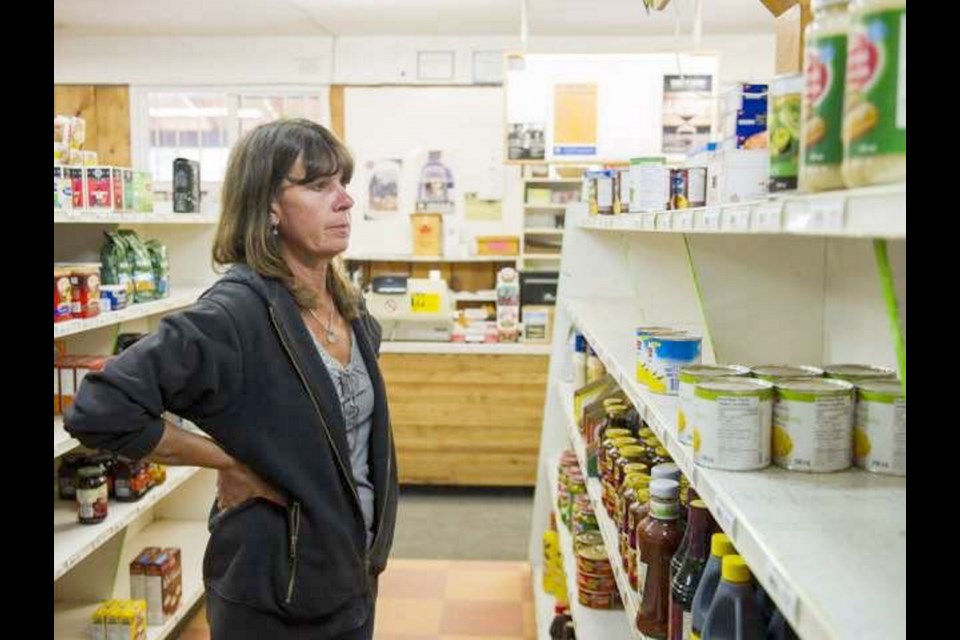HORSEFLY — For the time being, this small community is a safe haven for its 800 or so residents just outside the eastern edge of a red-hot wildfire evacuation zone in the Cariboo region.
Even though the people are in a rare Cariboo community not on an evacuation alert or under an evacuation order, theirs is — temporarily at least — a strange existence.
They can leave, but they are not allowed back in.
The only authorized exit route — a one-way trip — is through the evacuation zone to Highway 97 at McLeese Lake, and on north to Prince George.
“They tell us it’s the safest place to be right now. I don’t know if that’s true,” said Brigitte Sharp, who works at Horsefly Hardware.
She’s a little unsettled by the fact the region to the west through to Williams Lake is under evacuation order, while Horsefly is not.
“I will stay as long as I can,” said Sharp, noting she built a house just three years ago here. “If I see flames, I’ll re-evaluate.”
Gloria Evans, however, decided it was time to get out.
She was poring over a map late Monday afternoon, trying to determine if there was a southern route, however unlikely, with multiple road closures, that she could use to get to Langley, where she moved from recently.
“It’s a bit unnerving that you could be cut off,” said Evans. “It’s a rare form of torture.”
At the hardware store, residents were asking about feed for their horses, pigs and chickens, and also for dog food.
They have been in short supply.
Other supplies have been hard to come by as well — milk, produce and some canned goods.
With the community’s main supply point, Williams Lake, evacuated, and access to the town limited to those with permits from the Cariboo Regional District, deliveries have been limited.
At Clarke’s General Store, where the shelves were quickly emptying, clerk Lisa McInnes said the store owner would be making a supply run on Tuesday through closed roads to Williams Lake, but there was no way to know what he might bring back.
“It’s getting pretty thin,” she said.
As in other areas affected by the wildfires in the B.C. Interior, where nearly 50,000 people have been displaced, residents here have been helping each other out.
Those with gardens, for example, are sharing produce.
There have been other issues — the power had gone down for a period, for instance.
Outside of Horsefly, in the evacuation zones, it was more than a little desolate on Monday.
There was little traffic on the gravel roads.
At one ranch, a large John Deere tractor blocked the road entrance between a wooden fence, presumably to discourage unwelcome visitors.
While the sky was clear during the afternoon, by the evening smoke had started to move in, and it hung thick along the southern hills off Beaver Valley Road, to the west of the community.
In Horsefly, there were other signs of a community being cut off.
The post office is not sending or receiving mail, and the Anvil Pub has been closed until further notice.
The gas station had a sign posted to the door: “$50.00 per family evacuation vehicle.”
Gas station owners Mark and Julie Caron said Monday they expected a delivery the next day.
Mark, captain of the community’s volunteer fire department, said residents were nervous on the weekend when big plumes of smoke from a fire in the Spokin Lake Road area, southwest of town, grew in size and intensity when winds picked up.
“It looked like a mushroom. It was so big, it looked close,” said Mark.
There is a group of smaller fires to the northwest in the Big Lake Ranch area and also to the north of Horsefly.
This community has also become a sanctuary for some residents escaping fires, including in the Spokin Lake Road area, about 40 kilometres southwest by road.
At a campsite on the Horsefly River, just a stone’s throw from the general store, Curtis and Dawn Best have been waiting to see what happens next: Will they be able to go back to their homes or will they be driven away by fire?
They don’t want to leave because that will mean they will end up in Prince George, an emergency operations centre where more than 8,000 evacuees from the Cariboo have already been registered. “We know it will be a long time there,” said Dawn.
The last time the Bests were able to check on their home it was intact, but they have no idea if that is still true.
In the Spokin Lake area, 12 homes have already burned.
Curtis said the fire had burned into their backyard and in the treeline not far from their home. Dawn’s sister’s trailer also burned to the ground.
Among the possessions they have taken with them are two restored classic cars that their son Craig, who is from Williams Lake but also staying at the campsite, helped them evacuate.
Jim Eastman, his wife Rose and daughter Teanna were also camped at Horsefly River.
Evacuated with them were three dogs, two cats and three ferrets. The three ferrets share one tent, the cats another.
Eastman also believes his home was spared in the fire, but he can’t be sure.
“There’s not much you can do,” he said. “You sit back and hope for the best.”



